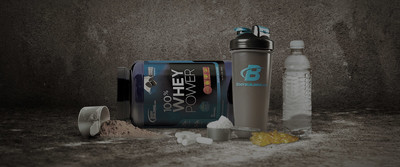Supplements tend to mean different things to different athletes. A bodybuilder might look at a bottle of branched-chain amino acid capsules, for instance, and see increased muscle growth and sustained muscle protein synthesis. A triathlete could look at the same bottle and see relief from post-training muscle soreness. A bikini competitor could see herself retaining muscle mass while cutting for a show.
When it comes to the amino acid compound citrulline malate, all three of these athletes can see a single major appeal: delaying the onset of fatigue during intense training. Endurance athletes have been supplementing with citrulline for just this reason for many years, and after a slew of promising studies in recent years, strength athletes are on board as well. Along the way, citrulline has become a nearly obligatory ingredient in pre-workout supplements or any product that promises bigger muscle pumps during workouts.
But is fatigue-fighting the only thing citrulline malate does? Definitely not. Here's why this amino acid compound is earning fans across the athletic spectrum.
What is Citrulline Malate?
Citrulline is an amino acid that is produced when the amino acid ornithine combines with carbamoyl phosphate. This happens during the urea cycle, a way that the body disposes of nitrogen waste. The excess citrulline from supplementation is thought to put the urea cycle into overdrive, sucking up the ammonia (made of three nitrogen molecules) produced by working muscles before it can produce fatigue.
Citrulline is also a by-product of the body's conversion of the amino acid arginine into nitric oxide (NO). Excess citrulline, a number of studies have shown, increases the amount of arginine in the blood, leading to increased NO production. More NO, you may have heard, means increased blood flow to muscles during exercise, which allows them to last longer under duress—and produce bigger muscle pumps to weightlifters.
Malate, or malic acid, is a salt compound that is often used as a food preservative and, in nature, contributes to the sour flavor of apples and other fruit. In supplemental form, it is bound to citrulline and other various other supplements to give them stability in the body.
However, malate is also thought to have fatigue-fighting capabilities of its own, by supporting the body's own ability to recycle exercise-generated lactic acid and use it for energy.
Longer Workouts, Less Soreness, Better Recovery
By accelerating ammonia clearance, supplemental citrulline postpones the inevitable decrease in muscle pH that happens during intense exertion. As pH drops, the muscle becomes more acidic, and fatigue rapidly sets in.
A 2010 study by Spanish researchers looked at how this process affected the results male strength athletes were able to achieve in bench press workouts. The subjects who were taking citrulline malate squeezed out 50 percent more repetitions when working to the point of muscular failure than subjects taking a placebo.
What's more, supplementing with citrulline malate also helped reduce muscular soreness following this high-volume weight training.
Attenuating soreness isn't the only way that citrulline has been shown to aid in recovery, though. Another group of Spanish researchers gave citrulline malate to a group of male professional cyclists, a demographic whose hard-training methods often leave them with compromised immune systems and illnesses such as upper respiratory infections.
The subjects who took the citrulline experienced reduced and delayed onset of the body's immunosuppressive mechanisms that are usually seen after intense exercise. This suggests that citrulline has the potential to help the body heal from intense training and avoid some of the symptoms that often get lumped under the label "overtraining."

Citrulline has been shown to be more effective at increasing plasma arginine levels than supplemental arginine.
Another group of researchers from Spain took a closer look at how citrulline supplementation worked during exercise, and they came to some conclusions that fans of other ergogenic aids will find valuable. Citrulline's proven ability to increase blood arginine levels, they concluded, had the potential to enact a wide range of benefits, including elevated protein synthesis, creatine synthesis, and more efficient BCAA utilization by muscles during exercise.
So why not just supplement with arginine?
Early pre-workout supplements were packed with L-arginine, due to the numerous benefits that have been shown from having elevated blood arginine levels: greater NO production, muscle protein synthesis, and faster recovery, for starters.
However, in recent years there's been an industry-wide shift toward citrulline and away from arginine. The reason is simple: Citrulline is more effective at increasing plasma arginine levels than supplemental arginine.
You read that right! A German study focusing on heart patients found that a 3 gram dose of citrulline malate yielded improvements in vascular function and vasodilation equivalent to a 6g dose of arginine. And as anyone who dabbled in the original NO-boosting supplements of the 1990s and 2000s will tell you, arginine is hard on the stomach and digestive system. Side effects from citrulline are far less common, and are usually limited to some mild stomach cramping when they occur.

If you're committed to performance-focused training but don't want to sacrifice your health in the process, citrulline malate could be what you're looking for.
Additionally, since the liver doesn't break down citrulline at the same rapid pace as arginine, its beneficial effects last longer. As many strength athletes have discovered, being able to get the vascular benefits of arginine, without having to supplement with arginine, is ideal.
The Bottom Line
The most promising research into citrulline malate is still fairly new, and we have a lot to learn about this supplement. But the research that exists is encouraging—with a caveat. Looking at the studies that have been done, I think it's clear that if you are going to the gym, punching the clock, and doing a couple of sets here and there for each body part, citrulline isn't going to help you much.
Who will it help? It will help athletes who train hard and push their physiological limits for training and recovery. If you're committed to training and improvement and aim for that extra 5, 10, 15 percent bump in performance, without having to sacrifice your health to get it, then citrulline malate could be just what you're looking for.
Vital Stats
- Name: Mike Roussell, PhD
- Occupation: Nutritional consultant, speaker, author, nutrition advisor for Men's Health, head of nutrition at PEAK Performance in New York City
- Education: BA in biochemistry, Hobart College. PhD in nutrition, Penn State University.
- Website: www.mikeroussell.com
References
- Perez-Guisado J, Jakeman PM. Citrulline Malate Enhances Athletic Anaerobic Performance and Relieves Muscle Soreness. The Journal of Strength & Conditioning Research 2010;24(5):1215-22 10.519/JSC.0b013e3181cb28e0.
- Orozco-Gutierrez JJ, Castillo-Martinez L, Orea-Tejeda A, et al. Effect of L-arginine or L-citrulline oral supplementation on blood pressure and right ventricular function in heart failure patients with preserved ejection fraction. Cardiology journal 2010;17(6):612-8.
- Sureda A, Cordova A, Ferrer M, Perez G, Tur J, Pons A. L-citrulline-malate influence over branched chain amino acid utilization during exercise. European Journal of Applied Physiology 2010;110(2):341-51. doi: 10.1007/s00421-010-1509-4.
- Effects of L-citrulline oral supplementation on polymorphonuclear neutrophils oxidative burst and nitric oxide production after exercise. Free Radical Research 2009;43(9):828-35. doi: doi:10.1080/10715760903071664.

